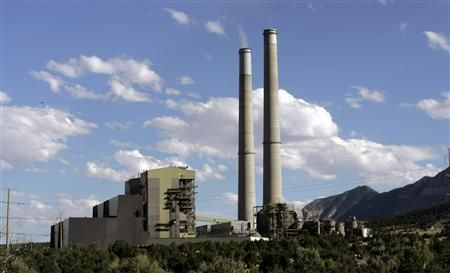Obama Administration To Unveil Proposed First Carbon Pollution Limits For Existing Power Plants

Environmental Protection Agency Administrator Gina McCarthy on Monday will reveal a set of proposed rules aimed at forcing existing power plants to cut carbon emissions in the first such initiative in the nation's history.
The proposal is seen as a central weapon of President Obama’s fight against climate change, and though he won’t announce the rules with McCarthy, Obama is expected to dedicate his Saturday morning weekly address to the coming carbon pollution rule.
The executive action comes after Democrats’ cap-and-trade bill failed in the Senate four years ago.
Electric power generation is responsible for about 40 percent of carbon dioxide emissions in the U.S, making it the largest source, according to the Center for Climate and Energy Solutions, formerly the Pew Center on Global Climate Change. Obama’s Climate Action Plan, of which the rules to be announced Monday will be a part, aims to reduce overall U.S. greenhouse gas emissions 17 percent below 2005 levels in six years. Last June Obama directed the EPA to set standards for new and existing power plants.
Monday’s draft of rules won’t be finalized until at least June 2015, and then states will have another year to create their own plans for compliance. States aren’t expected to begin complying with the rules for another four to six years. The EPA will field public comments on the proposal and make revisions as it sees appropriate.
Meanwhile, politicians, environmentalists and fossil fuel industry leaders are preparing for a massive battle to win public opinion to their various sides, though predictions are skewed with uncertainty about future costs of electricity.
The U.S. Chamber of Commerce claims the soon-to-be-announced regulations would force consumers to pay billions more for electricity, while the Natural Resources Defense Council (NRDC), an environmental group, claims the rules would lower energy bills.
Peter Altman, NRDC’s climate and clean air campaign director, called the fight over carbon standards “essentially the Super Bowl of climate politics” at a press conference Wednesday.
“For the first time, climate change is going to be front and center as the national issue,” David Goldston, director of government affairs at NRDC, said Wednesday. “And what that means, we think, is that when this battle is over and the power plant standards are in effect, climate will have turned into an ordinary environmental issue.”
The American Petroleum Institute, the oil and gas industry’s largest lobby, said Tuesday that “nearly the entire country would be closed for business” if the EPA further tightened ozone standards in Monday’s proposal.
“Tightened standards could impose unachievable emission reduction requirements on virtually every part of the nation, including rural and undeveloped areas,” Howard Feldman, API’s director of regulatory and scientific policy, told reporters Tuesday in a conference call. “Needless to say, operating under such stringent requirements could stifle new investment necessary to create jobs and grow our economy. These could be the costliest EPA regulations ever.”
Republicans generally have criticized the rules ahead of their release, while Democrats have generally defended the regulations.
House Speaker John Boehner, R-Ohio, said Thursday at a press conference that he’s not “qualified to debate the science over climate change” but “every proposal that has come out of this administration to deal with climate change involves hurting our economy and killing American jobs.”
© Copyright IBTimes 2025. All rights reserved.






















